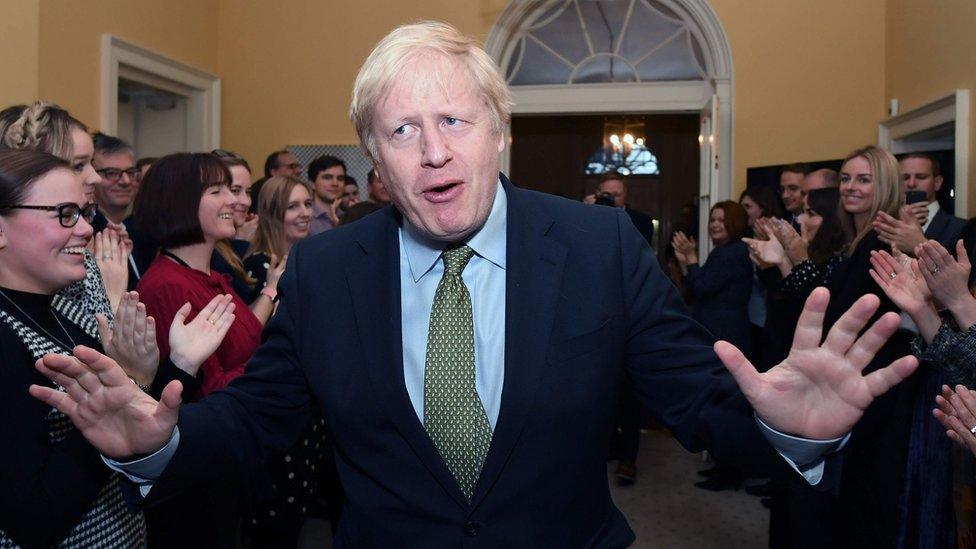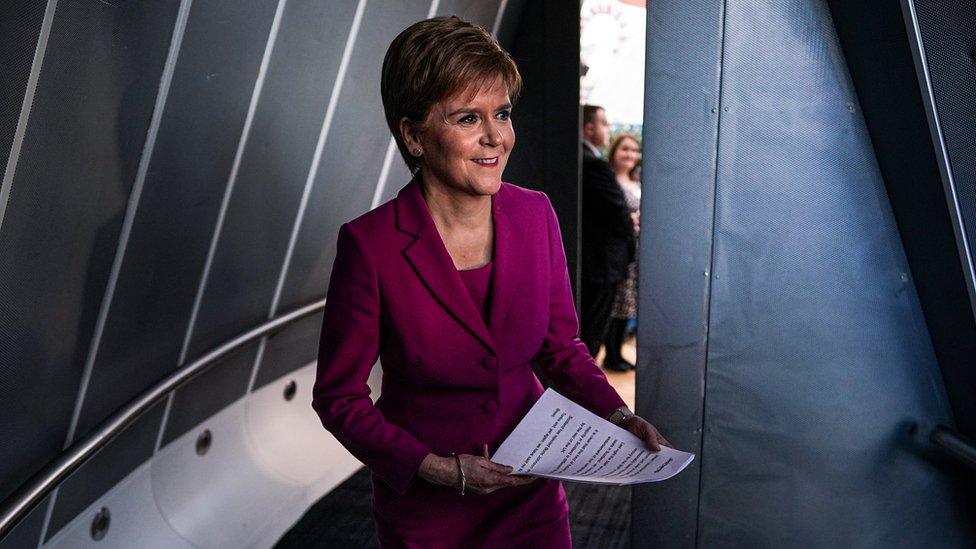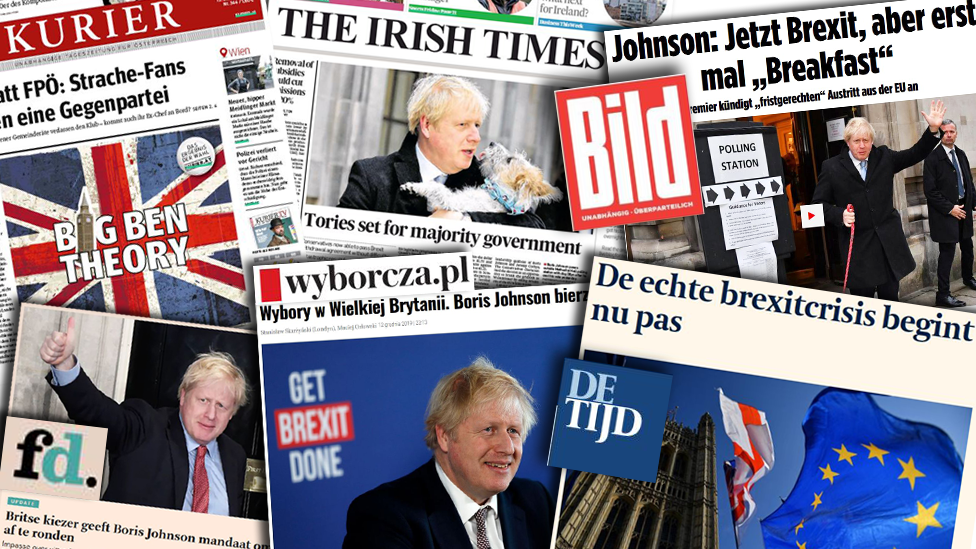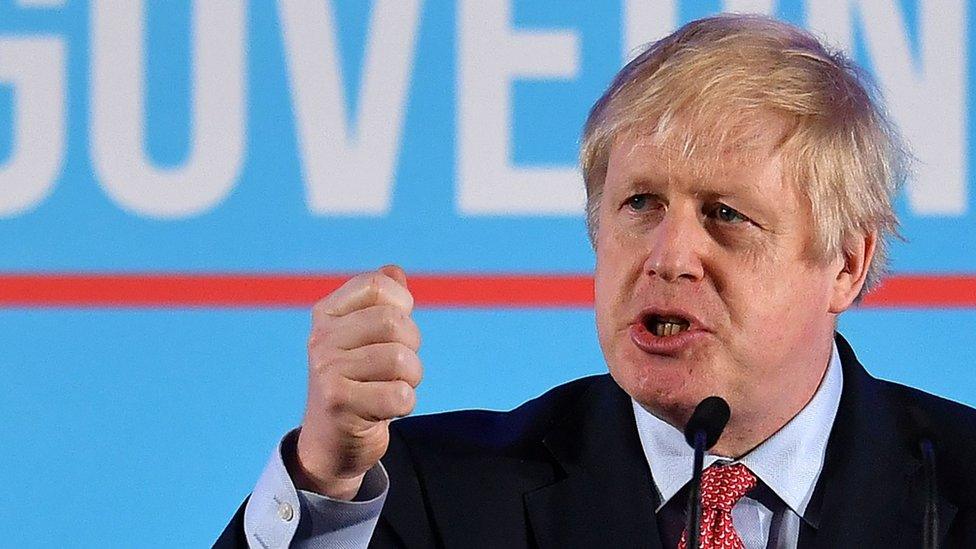Election 2019: The showman becomes victor
- Published

Loyalty and a ruthless ability to adapt were the twin weapons that once guaranteed the Tories a place as Britain's natural party of government.
In recent years, however, rebellion against successive leaders from both sides on the Europe divide has been the party's default position.
Internal squabbling came first, banishing memories of the collective Tory survival instinct that once served the party so well.
The emphatic nature of Boris Johnson's win in the country means he is the unequivocal victor in the Conservatives' 30-year civil war over Europe.
"In the end the Leavers will win because they care more," one cabinet minister once told me.
The prime minister achieved those victories and will hope to sustain his new electoral coalition in the country by harnessing the power of those old and formidable Tory weapons - loyalty and a knack for evolving in new times.
Loyalty, for now, is guaranteed after all 635 Conservative candidates signed a pledge to support his Brexit deal. And the prime minister's pitch in Labour's "Red Wall" - an end to austerity and support for public services - marked a return to ruthlessly adapting to changed political circumstances.
While Boris Johnson has re-enlisted those two old Tory weapons, there is one historic element of the party's mission that has a less certain future: the Union.

The SNP - led by Nicola Sturgeon - won 48 seats in Scotland
On two fronts the United Kingdom is possibly entering its most perilous phase in modern times.
The SNP's landslide in Scotland sets up a constitutional clash between Holyrood and Westminster. Nicola Sturgeon will use the SNP's success to demand a section 30 order from Westminster - the ability to hold a legally binding referendum on independence.
Boris Johnson is highly likely to refuse such a request, on the grounds that the last section 30 order was granted by David Cameron on the understanding by all sides that the first independence referendum would settle the issue.
The SNP will say circumstances have changed. They will hope that if Westminster is seen to thwart what they claim is the current will of the people, that may increase support for independence.
Across the water, the prime minister is planning to take the UK out of the EU on the basis of a deal that is rejected by all the main parties in Northern Ireland. The loss of confidence is so great that during the election the DUP leader Arlene Foster said that in future she would have to check whether what Boris Johnson says is "factually correct".

WHO WON IN MY CONSTITUENCY? Check your result, external
NATIONAL PICTURE: The result in full, external
ALL YOU NEED TO KNOW: The night's key points
MAPS AND CHARTS: The election in graphics, external
LAURA KUENSSBERG: Same PM, new map
BREXIT: What happens now?
IN PICTURES: Binface, a baby and Boris Johnson

The prime minister insists that under his Brexit deal there will be no checks on good travelling from Great Britain to Northern Ireland. The DUP says that HMRC have told them there will be checks.
In the last 45 years, there have been two salutary reminders of the perils of introducing substantial governance changes in Northern Ireland without the support of the majority Unionist community.
In 1974, loyalists brought down the Sunningdale Agreement - an early version of the Good Friday Agreement - in protest at its provisions for power sharing in Northern Ireland and a proposed cross-border body. The loyalists closed the Ballylumford power station, the largest in Northern Ireland, which stands next to the port of Larne where some of the Great Britain - Northern Ireland checks may have to take place.
A decade later Margaret Thatcher failed to consult Unionists when she gave Dublin a formal consultative role in Northern Ireland in the 1985 Anglo Irish Agreement. Unionist protests, under the banner of Ulster Says No, brought parts of Northern Ireland to a standstill.
But Thursday's fall in the vote share for the two main parties - Sinn Fein and the DUP - may change the dynamics in Northern Ireland. It could strengthen the hand of those pressing for a return of the assembly and the executive.
And Boris Johnson's deal gives the Stormont institutions a say in Northern Ireland's future relationship with the EU.
For so long written off by some in his own party as a lightweight showman, Boris Johnson has secured an historic win that redefines the electoral map in England and Wales. He will be hoping that it does not break the wider UK map.
You can watch Newsnight on BBC Two at 22:30 on weekdays. Catch up on iPlayer, subscribe to the programme on YouTube, external and follow it on Twitter, external.
- Published13 December 2019

- Published13 December 2019
- Published13 December 2019

